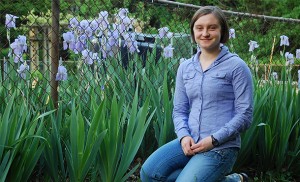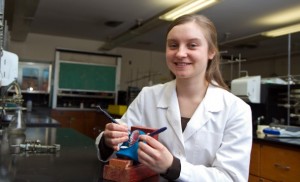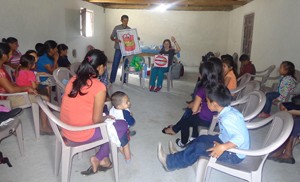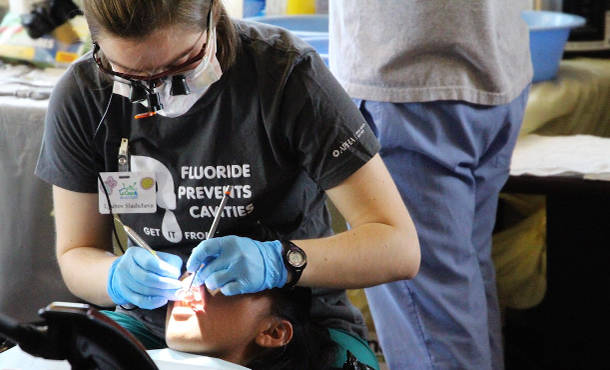[Reprinted with permission from VCU]
Lyubov Slashcheva arrived in the United States when she was 5 years old not knowing a word of English, but already determined to make an impact in her new country. The youngest of three children, she emigrated with her family from a small mining town in a remote corner of Kazakhstan to the Shenandoah Valley shortly before enrolling in kindergarten.
“My parents had heard of the increased opportunities that would be available to their children in the U.S.,” Slashcheva said, adding that while her parents did not understand the American academic system very well, “they were very supportive that their children excel to their greatest potential.”

On May 12, two days before she graduates with a doctor of dental surgery degree from the Virginia Commonwealth University School of Dentistry, the VCU Center for Interprofessional Education and Collaborative Care will recognize Slashcheva at the Excellence in Interprofessional Education awards ceremony. The award serves to commend students who have demonstrated significant involvement and interest in promoting interprofessional activities during their time at VCU. Slashcheva will be among 10 students to receive the award.
Lyubov Slashcheva visited villages surrounding Gracias, Honduras in December to provide dental hygiene education to the residents.
“The end of the academic year provides a moment to recognize those students who made substantial extracurricular commitments to interprofessional activities,” said Alan Dow, M.D., assistant vice president of health sciences for interprofessional education and collaborative care. “These are students who went above and beyond to reach across professional boundaries while also engaging with patients and community members in impactful ways.”
Going above and beyond expectations is nothing new to Slashcheva, who graduated from high school two years early as the valedictorian. Now at 23, her academic and professional successes distinguish her as an exceptional student both in the classroom and clinical setting. A tireless advocate for underserved populations, Slashcheva’s interest in dental public health and the health disparities of older adults and individuals with developmental disabilities has encouraged her to develop fluency in interprofessional collaboration. She attributes much of her achievement in this arena to the opportunities afforded to her at VCU. “It has been exciting to see interprofessional education take form and develop throughout my time at VCU,” she said. “Being a part of that effort has been really inspiring.”
Determined to succeed

Slashcheva had planned to pursue a nursing degree at Eastern Mennonite University, but two weeks before she was set to enroll in classes she was serving as an English interpreter at the dentist with her father when her father’s dentist persuaded her to study dentistry instead. She shadowed her father’s dentist in his practice that summer and changed her major from pre-nursing to pre-dentistry.
Slashcheva approached her undergraduate studies with the same tenacity that she had applied to learning English as an elementary school student and graduating high school at the top of her class as a 16 year old. While enrolled full-time at EMU, she took community college classes on the side, worked at the university’s Early Learning Center, volunteered at the local free clinic and traveled to Lithuania for three months as part of the university’s cross-cultural program. She also played flute in the university’s chamber orchestra and directed the choir at her church.
“I have explored my own limits and I continue to be surprised when my interests move me beyond them.”
A quote from Einstein that was printed on a calculus syllabus inspired her to continue charging toward her goals. “It says, ‘Once we accept our limits, we go beyond them,’” Slashcheva said. “I have explored my own limits and I continue to be surprised when my interests move me beyond them.”
Slashcheva completed her undergraduate degree in pre-dentistry at Eastern Mennonite University in less than three years, graduating in December 2011.
From January to April 2012, she volunteered at health clinics in Honduras and Peru with the Luke Society, which is an international medical mission organization. It was there that she first witnessed the benefit of a collaborative approach to medicine.
“That collaborative approach is even more important when the public health infrastructure is not in place,” Slashcheva said, adding that the patients in the villages she visited had many oral health issues related to a spike in access to sugary drinks and processed foods.
The dental problems they were facing could be addressed by a dentist, but the dentists relied on physicians and nurses to tackle the other health problems caused by poor nutrition.
“There are many oral health disparities that are linked to overall health,” she said.
Soon after returning to the U.S., Slashcheva enrolled in the VCU School of Dentistry with aspirations to learn interprofessional collaboration skills in addition to clinical dentistry.
An interprofessional approach

Slashcheva was 19 years old when she started dentistry school at VCU, but she didn’t let her age stand in the way of seeking out leadership opportunities at the university.
As a second-year dentistry student, Slashcheva assumed the role of president of the Inter Health Professionals Alliance. As the university’s largest interprofessional student organization, IHPA includes representatives from the Schools of Allied Health Professions, Dentistry, Medicine, Nursing, Pharmacy, Social Work, the Department of Biomedical Engineering in the School of Engineering and participants of the VCU Dietetics Internship program. The organization’s goal is to engage students in networking, health outreach, skill-building and scholarly activities with the ultimate objective of not only encouraging relationships across disciplines during school, but also encouraging an interdisciplinary focus while working with patients as professionals.
Lyubov Slashcheva visited villages surrounding Gracias, Honduras in December to provide dental hygiene education to the residents.
The summer before her second year, Slashcheva attended the National Interprofessional Initiative on Oral Health summit and presented to the consortium of health professionals about the role of IHPA at VCU. “They wanted to see how oral health was being addressed in our organization,” Slashcheva said. “It was inspiring to see leaders from a variety of organizations come together to talk about interprofessionalism and how oral health is the tool that can bring the health professions together.”
Slashcheva has also taken advantage of the numerous volunteer opportunities offered through the School of Dentistry. She frequently volunteers with Missions of Mercy, which is a community-based organization that provides free health care and prescription medication to uninsured and under-insured individuals. She has also volunteered in Wise County, Virginia with Remote Area Medical clinic, which is a nonprofit, volunteer medical relief corps that provides free health care, dental care, eye care, veterinary services and technical and educational assistance to people in remote areas of the U.S. and around the world.
“Those experiences affirmed that even within the U.S. health care system there are gaps, especially in underserved populations,” Slashcheva said.
While in Wise County, Slashcheva saw patients who had oral health problems that were linked to methamphetamine use. “It is not just the meth that is creating the cavities,” she said. “It is also that being on meth will make people crave sugary drinks like Mountain Dew. Substance use often has implications on mental health, which is linked to diet and creates an awful oral health situation. Many professions are necessary to address those patients’ issues.”
Currently, Slashcheva serves as president of the American Academy of Developmental Medicine and Dentistry’s Student-Resident Committee. The AADMD is an organization for health professionals who provide clinical care to people with neurodevelopmental disorders and intellectual disabilities.
“The health care system is especially difficult to navigate for them,” Slashcheva said. “Those populations are a great place for interprofessional collaboration to take form and have an applied need.”
At the VCU School of Dentistry, Slashcheva founded a special care interest group that focuses on older adults and people with disabilities. The school subsequently incorporated a course on special needs dentistry into the curriculum and added clinical opportunities for students who were interested in providing care to that population. “It is exciting to see how student initiatives can influence curriculum changes,” Slashcheva said.
Leading by doing

Soon after accepting the Excellence in Interprofessional Education Award and graduating from the VCU School of Dentistry, Slashcheva will move to Iowa to start a master’s degree in dental public health at the University Of Iowa College Of Dentistry.
In May, however, she will only have time to set down her bags at her new residence before flying to India. “I have a month off and I feel like I should take advantage of it,” the 23-year-old said. Over the summer, Slashcheva will provide dental care to patients alongside physicians at a hospital in Northern India. “It will be a good transition from dental school into the public health program because what got me interested in public health to begin with was my time abroad before dental school,” she said.
After earning a graduate degree in public health, Slashcheva will complete a year-long fellowship in geriatrics and special needs dentistry. She will then work as a dentist for at least four years in an underserved community. Slashcheva was awarded a competitive scholarship to dental school from the federal government’s National Health Service Corps, which paid her entire tuition as well as a monthly stipend in return for a commitment to work at a NHSC-approved site in an underserved community for four years after graduation.
While Slashcheva will be sorry to leave her classmates at VCU, she says she is looking forward to starting school at the University of Iowa and continuing to lead interprofessional efforts on that campus.
“The recipients of the Excellence in Interprofessional Education Award are leaders in interprofessionalism and we are counting on them to shape the future of health care,” Dow said.
Slashcheva credits the opportunities she has been afforded at VCU with empowering her to realize Dow’s expectations.
“Emphasizing interprofessionalism prepares students to be leaders in whatever setting they are in because that interprofessional infrastructure might not be in place where we go next,” Slashcheva said. “Having the experience along with knowing what the training is like equips me with the courage and experience to lead interprofessional efforts wherever I go.”
